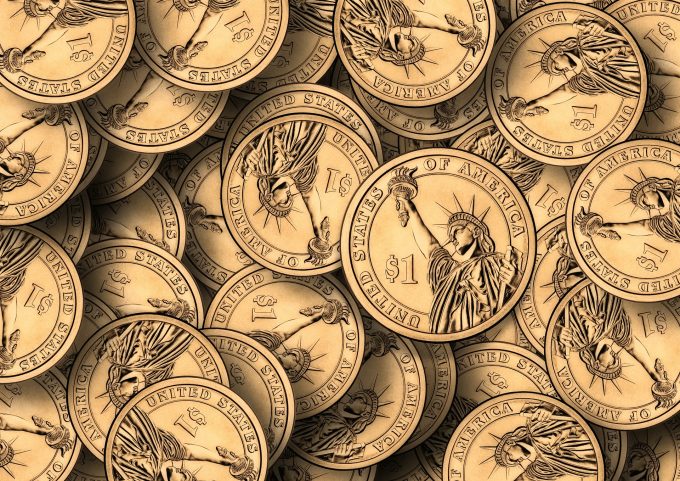The dollar’s historically large fall against the euro helped knocked 8.2% off the net asset value of Partners Group Private Equity (PEY) in the first half of the year.
Chair Peter McKellar said it was a “disappointing” result after the 11.4% gain the £705m investment company made last year.
The shares were unchanged at €10.20 as the company reports its net asset value every month so the €13.79 of NAV per share at 30 June was already known.
The 2.5% return from the payment of the first dividend also reduced the total underlying decline to 5.7%.
Nevertheless, the dollar’s 12% slump against the single European currency was painful for the euro-denominated portfolio which is 42% invested in the US. Currency movements alone reduced NAV by 5.4%, masking 0.9% “value creation” by Partners Group, the Swiss fund manager.
The role of currency movements in affecting returns also evokes memories of the 2022 dividend cut the former Princess Private Equity imposed after a previous policy of hedging foreign exchange exposure backfired and proved too costly.
The investment company is not alone in feeling the impact of the weak dollar. CT Private Equity (CTPE), one of the better performing listed private equity funds in recent years, also reported a first half fall. Its net asset value dropped 4.5%, a decline that reduced to 2.5% with dividends included. It blamed currency movements and finance costs for depressing an otherwise stable portfolio.
The company pointed out that 90% of its investments were still valued at 31 March and reflected more of the first quarter fears over US tariffs and less of the recovery that took place in the second quarter.
James Carthew, head of investment company research at QuotedData, said: “It is interesting to see that in the six-month figures for Partners Group Private Equity and CT Private Equity the main reason for their NAV falls was adverse foreign exchange movements. Trump’s ambition to weaken the US dollar is being realised. Most managers you’ll talk to will be wary of trying to hedge against foreign exchange movements, it is often expensive, can easily be mistimed, and they’ll usually suggest that investors can choose to do their own hedging if they want to. I haven’t yet discovered a cost-effective way of doing that for my own portfolio but I am increasingly wary of having too much US dollar exposure and have been adjusting things accordingly.”
Second quarter improvement
Partners Group Private Equity said the second quarter saw a “meaningful improvement” after US president Trump announced a pause in the imposition of widespread import duties.
Including the dividend, shareholders saw their stakes decline 5.5%.
McKellar hoped the second half of the year would produce a positive return as financial markets stabilised as the level of mergers and acquisitions improved.
He pointed to the fund’s partial exits from two of its top 10 holdings last month – PCI Pharma Services and Techem – in line with their recent valuations as evidence that the portfolio was correctly valued and could look forward to further “meaningful exits” as more of its mature pre-2020 investments were sold.
Despite the challenging macroeconomic environment, trading by portfolio companies remained good with growth in earnings accounting for over three quarters of the 8.2% portfolio return in the 12 months to June. Nearly half the portfolio was invested in companies growing their profits at over 10% a year, he said.
Wide discount a top priority
The chair said the board and fund manager were as a “priority” exploring “credible opportunities to improve demand and liquidity in the shares” which could be a reference to finding new investors in Europe and exploiting Partners Group’s global distribution platform.
The shares traded between 27% and 35% below net asset value in the first half. McKellar said the discount was “exercising’ both the board and Partners Group who recognised it was too high, even if geopolitical uncertainty had contributed to the valuation gap that is all a problem for most of its sector.
Under a new capital allocation policy reaffirmed in March, the company has promised to buy back its cheap shares and enhance shareholder returns when it has sufficient cash. It received €39.6m (£34.1m) in distributions from companies in the first half and with the “meaningful” payouts from PCI and Techem will decide at the end of September whether and how much it can return to investors. In the meantime, shareholders will have to settle for the 5% semi-annual dividends which are set to return over €50m this year.
Deutsche Numis, the corporate broker, estimated that at the current 27% discount, around €2.7m could be available for buybacks in October with more potentially coming from further reductions in its listed holdings in India’s online grocer Vishal Mega Mart and Swiss skincare group Galderama as well as future exits from mature private equity investments.
The company will learn on 3 September whether it has been included in the FTSE 250 index, for which it is now eligible, potentially increasing demand for the shares.
Sorting out the discount is urgent. The failure of the shares to reflect the underlying investment returns means shareholders have received a total return of 43.7% over five years, placing it near the bottom of the Private Equity listed funds sector where it is under pressure from AVI, holder of nearly 20% of its shares.
James Carthew is presenting an “Understanding Private Equity” discussion at 11am this Friday with Alan Gauld from Patria Private Equity, Steve Tredget from Oakley Capital and Andrew Carnwath from CT Private Equity. Register here!
